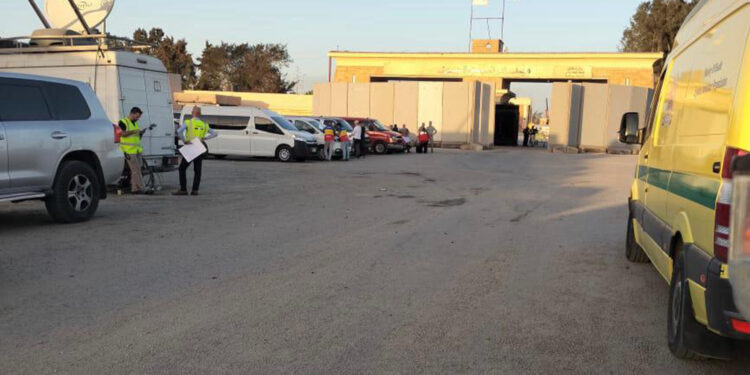An investigative report in the French newspaper Le Monde stated that crossing the Rafah crossing – the only way out of the hell of Gaza – has become a lucrative business for those who benefit from the war and an unbearable burden on those who want to leave.
The report, prepared by writer Ilan Salon, stated that a network of intermediaries and travel agencies sell exit permits from the Gaza Strip to Egypt at exorbitant prices amounting to several thousand dollars.
As the Israeli army tightened its grip on the southern Gaza Strip, after more than 100 days of war that claimed the lives of more than 25,000 Palestinians, the number of these intermediaries increased even among those who could benefit from the evacuation mechanism established in November 2023 for foreign citizens. and wounded Palestinians, to collect exorbitant sums of money to leave the Gaza Strip.
Exorbitant amounts
According to an investigation conducted by the Corruption and Organized Crime Reporting Project and the Sahih Misr website, intermediaries sell these permits for amounts ranging between $4,500 and $10,000 to Palestinians, and between $650 and $1,200 to Egyptian citizens. Independent brokers, with sometimes questionable credentials, embarked on this highly lucrative business.
The writer stated that investigators from the Corruption and Organized Crime Reporting Project and the “Sahih Misr” website contacted 15 Palestinians and Egyptians who used these mediators. Only two of them were able to leave the Gaza Strip, and each of them paid $4,500. Three others were defrauded by intermediaries and lost their money, while others are still seeking to collect the required amount by selling their gold or personal property, borrowing from relatives, or Online fundraising. This is the case of Rasha Ibrahim, from whom the mediator asked for more than $40,000 to get her out of the Gaza Strip with her husband and their three children.
Corruption allegations
“We can’t afford it,” said 31-year-old Egyptian Rasha, who has taken shelter in a tent in the center of the Strip since Israeli bombing destroyed her home near Gaza City. Rasha thought that her Egyptian passport would open the doors of Rafah for her and also for her husband and children who hold Palestinian citizenship. It has not yet received a response to the repatriation request that it sent on the electronic portal opened by the Egyptian authorities at the beginning of December 2023.
One Egyptian, who requested to remain anonymous, lamented: “Only those who have money can pay and leave,” saying that a travel and tourism agency in the southern Gaza Strip asked him for $6,500 for him, his wife, and their eight children, knowing that all of them are Egyptians.
The report stated that Palestinians, whose relatives were seriously injured but had not yet been evacuated, also turned to mediators. Mahmoud, a 23-year-old Palestinian who lives in Cairo, explained: “The brokers asked us for $9,500 to get my wife out and $7,000 for each of my two nieces, Farah and Reham, who were seriously injured during the war and are in a wheelchair.”
Online promotion
Travel agencies promote their services online. An Egyptian agency claims that it charges $7,000 for each transit permit for Palestinians, $1,200 for Egyptians, and $3,000 for other nationalities. Investigators with the Organized Crime and Corruption Reporting Project and Sahih Misr were unable to determine how these service providers were able to obtain transit permits in a timely manner.
On the other hand, the head of the Egyptian Information Service, Diaa Rashwan, in a statement issued on January 10, considered that the allegations of imposing additional fees on the Palestinians are “unfounded,” calling on them to denounce these practices.
Parallel system
The writer stated that the existence of a parallel system that allows Gaza residents to purchase transit permits to Egypt is not a new matter. Since 2007, the opening of the Rafah crossing has been random. Egypt closed it almost completely after 2013 until May 2018, when restrictions were eased. In 2018, a report by the United Nations Office for the Coordination of Humanitarian Affairs noted the existence of a “dual-list” system, allowing Gazans to obtain a transit permit more quickly than others.
According to statements by the official spokesman for the Rafah crossing on the Palestinian side, Wael Abu Omar, to investigators of the Organized Crime and Corruption Reporting Project on January 11, “This parallel system is today the only option for exiting Gaza. It allows about 200 Palestinians and Egyptians.” By crossing Rafah daily.”
A client of a consulting and tourism company in the Gaza Strip confirmed to Le Monde newspaper that “the registration process through the Islamic Resistance Movement (Hamas) stopped after the war. The Palestinian side no longer has any relationship with these permits.”



